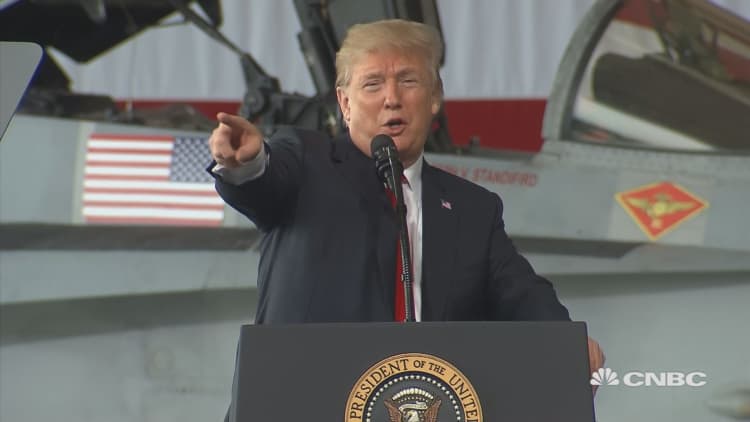A former NASA astronaut and retired Air Force fighter pilot says the U.S. military should create a space force, an idea that recently gained traction because of President Donald Trump.
A space force would have to be distinct from the Air Force, retired Air Force Col. Terry Virts argued, because it requires two different skillsets to launch and pilot planes and spacecraft.
"Having spent nearly three decades as an Air Force pilot, with 17 of those years in Air Force Space Command, I can say unequivocally that air and space are completely unrelated domains, in the same way that land is a separate domain from the sea," Virts wrote in a recent government research report.
Virts, a former International Space Station commander, added that the new space force should be separate from sister service branches in order to streamline operations.
"Today there are space forces in the Army, Navy and Air Force, as well as intelligence agencies. Combining many of them into a space force would reduce duplication," Virts wrote in the "Space Platforms and Hypersonic Technologies Taxonomy" report from government research firm Govini.
The move would knock down "bureaucratic barriers" and consolidate multiple chains of command, according to Virts.
He also makes a case for collaboration among the service branches, saying "the guiding principle should be if something needs to be launched to, intercepted or operated in, or returned from space, then the space force should be the lead."
A military presence in space is inevitable, according to Chris Taylor, CEO of government research firm Govini.
"At some point, we are going to have a group of people dedicated to space, it seems to me that this is a logical progression," Taylor told CNBC.
'We have the Air Force, we'll have the space force'

Trump floated his idea for a theoretical new branch, which he dubbed "space force," while addressing an audience of service members last month in San Diego.
"Space is a war-fighting domain, just like the land, air, and sea," Trump said. "We have the Air Force, we'll have the space force."
As it turns out, the proposed space force sounds a lot like the space corps legislation the Trump administration opposed last year.
In June, the House Armed Services Committee proposed the establishment of a space corps, a new branch of the U.S. military that would fall under the command of the Air Force, in the National Defense Authorization Act, or NDAA.
This prospective military service would relate to the Air Force similar to how the Marine Corps serves the Department of the Navy. The space corps would have an area of responsibility that encompasses the vast expanse outside of the Earth's atmosphere.
At the time, the White House, the Air Force and Secretary of Defense James Mattis disapproved of the idea of creating a space corps.
"I oppose the creation of a new military service and additional organizational layers at a time when we are focused on reducing overhead and integrating joint war-fighting efforts," Mattis wrote in a letter to the House and Senate Armed Services Committees.
While the legislation passed the House, the space corps bid did not make it into the final NDAA bill in November.


